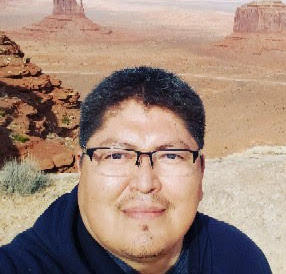Tommy Rock

Tommy Rock
My name is Tommy Rock; I am a member of the Navajo Nation from Monument Valley, Utah. I am the first in my family to get a doctoral degree. I got my Bachelor’s degree from Arizona State University in Environmental Geography and Recreational Management in 2002. I received my Master’s degree from Northern Arizona University in 2008. I went to the University of New Mexico for two years as a Research Scientist I under Johnnye Lewis, Ph.D. I was involved in the DiNEH Project until my funding ran out. I was funded under the National Institute of Environmental Health Supplement Grant. Afterward, I worked at Navajo Nation Environmental Protection Agency- Public Water Systems Supervision Program. I was there for two years when I realized I needed to get my doctoral degree. I returned to Northern Arizona University, receiving my Ph.D. in Earth Science and Environmental Sustainability in 2017.
My particular interest is pursuing a multidisciplinary approach to solving complicated issues such as sustainability in the Southwest from a Native American perspective. With a Ph.D. in Earth Science and Environmental Sustainability, I hope to integrate health, environmental, and cultural problems related to uranium mining into more informed decision-making on tribal lands. I am Navajo and from an area heavily mined, which has given me a very personal interest in these issues and is my reason for applying to the Ph.D. program in Earth Science and Environmental Sustainability. Many of my relatives were involved in uranium mining and died of cancer. Even to this day, my relative is still feeling the impact. I still have relatives who are getting diagnosed with cancer. When I fieldwork in Navajo Nation, I am reminded that many communities are still impacted by past uranium mining and milling. I saw many Navajo Nation families going through the same cancer-related problems associated with past uranium mining.
Since I am an Indigenous person from Navajo Nation, addressing the uranium contamination should reflect the Navajo Culture. Meaning that any developed policies the Navajo fundamental Laws would help make the procedures more effective. Traditional Ecological Knowledge can help the tribe improve their quality of life concerning uranium contamination. This is an area of interest in my studies and research. I got a chance to get support from the Dine’ Hataalii Association. I am working with them and am cautious not to over-expose our traditional teachings.
I had a Post Doctoral Research at the University of Utah at the Rocky Mountain Center for Occupational and Environmental Health. I did a pilot study with some northern tribes in Wyoming, South, and North Dakota. Currently, I have a Princeton University Presidential Post Doctoral Research Fellowship. I am involved in research on uranium and oil/gas fields in southern Utah and the Chaco Canyon area.
People and Partners
Yale School of the Environment
Kroon Hall
195 Prospect Street
New Haven, CT 06511
Email: ycej@yale.edu



